Genre: Sci-Fi/Drama/Thriller
Premise: (from Black List ) In the year 2065, a fiery teenager with a wild imagination, her paraplegic mom, and their clueless robot struggle to navigate the post-apocalypse; but when the mother’s wheelchair breaks, the trio must venture out into the dangerous “outside” for a chance to survive.
About: Today’s script finished with 11 votes on last year’s “best scripts of the year” Black List. Screenwriter Kryzz Gautier has written and directed a lot of short films. Her biggest credit up to this point is writing the Bioshock 4 video game.
Writer: Kryzz Gautier
Details: 114 pages

We’re going BACK to the Black List. This time for a little first act introspection. Today’s script takes on all of the challenges we’ve discussed about first acts and because the writer seems new to the medium, things get messy. But that’s okay because we’re all just trying to get better here. So let’s take a look!
Wheels Come Off follows 16 year old, Manoella Cortez, who lives in a city I can only assume is New York, a couple of decades after some massive catastrophic event has left the city in shambles.
Manoella spends most of her days with her 2 foot tall robot, Tony, scavenging apartments for food. Sometimes this means stealing from the dead. Sometimes it means stealing from the living. Which Manoella doesn’t feel bad about because she’s got to support her wheelchair-bound mother, Carla.
But when they run out of food, the two must go into the city together to try and accomplish a major food score. Unfortunately, they steal from the leader of a gang, Erick, who makes it his mission to find and kill both mother and daughter (and robot).
Along the way, our heroes meet up with a group of disadvantaged people (one has cerebral palsy, one is deaf, one is blind, etc.) and Manoella falls in love with their leader, a young woman named Ari.
But when Carla’s health deteriorates due to an injury, they must locate the last person she wants to speak to, Manoella’s father, who ran the robot company that may have caused the apocalypse. The extent to which Manoella cares for Carla will be put to the ultimate test when evil Erick figures out where they’re going and is determined to stop them.
Okay, let’s talk about what I liked here. I like that this is based on real life. Kryzz says on the title page that this script is inspired by her real life struggles while taking care of her disabled mother. It’s some of the oldest, yet, most valuable, writing advice you’ll hear: Write what you know. Because when you write what you know, you write specifically. “Specific” is the opposite of “general” which means you avoid writing a generic story.
I also liked the choice to make Manoella and Carla outsized personalities. Both of them were opinionated and talked a lot, which meant a lot of their dialogue was packed with energy.
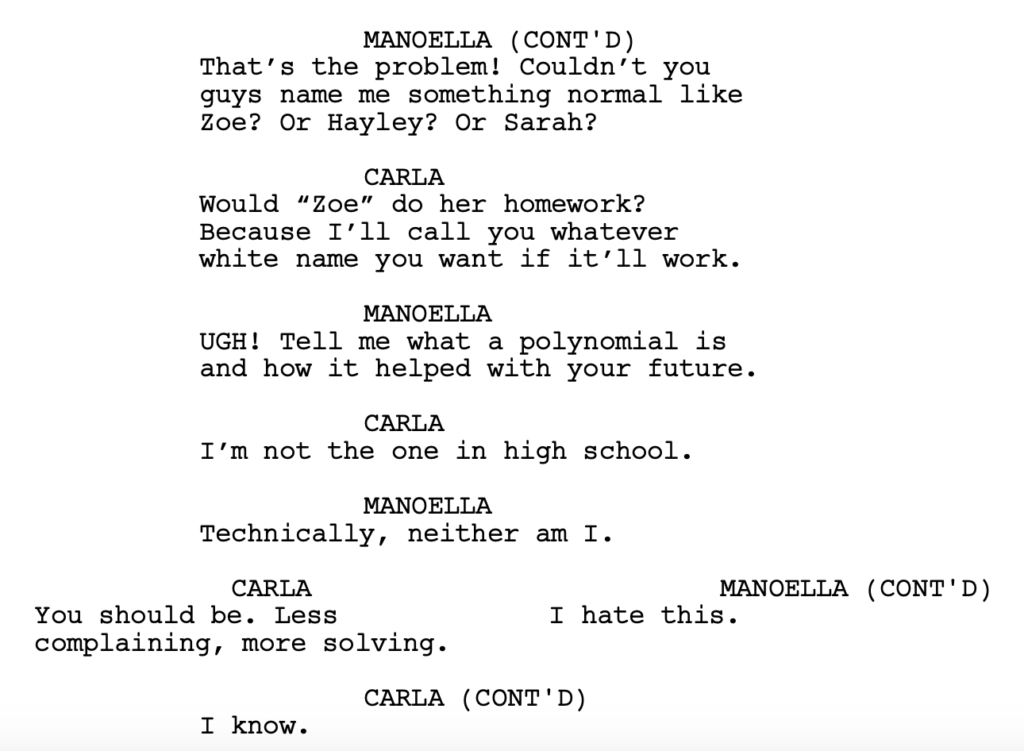
I also felt that, once Kryzz got out of the first act, the script became way more relaxed and free-flowing, which made the pages easier to read.
And that’s where I want to focus today’s review because the weakest part of the script, by far, is the first act. And since we’re talking about first acts this month, it’s a good first act to dissect. The combination of setting everything up as well as not understanding the screenwriting medium made for a bumpy ride that, if I wasn’t reviewing this script, I would’ve checked out by page 10.
Let’s start with the first line of action:
“A pair of legs sneak past wheels then exit an apartment.”
Take a hard look at this line because there’s something wrong with it. See if you can tell me what it is.
Did you figure it out?
The most important detail in the line is left out. What do the legs look like? Are they muscular? Thin? Long? Stubby? Hairy? Smooth? A man’s legs? A woman’s? Old? Young? Any one of those adjectives would’ve given us a much better feel for what was happening. But those details were left out. And this is a common occurrence with beginner screenwriters. The writer assumes the reader can read their mind.
We don’t know what’s in your head unless you tell us.
I must’ve given this advice five times this month on script consultations. Writers continue to think the reader can read their mind. I’m not saying you have to detail everything. I’m saying whatever the most important elements in a scene are, you need to detail those.
Think about it this way. The people watching this movie will be able to answer that question right? They’ll know whether the legs are muscular, thin, long, stubby, hairy, smooth, a man’s, or a woman’s. So why does the reader not get this information? The point of a screenplay is to detail what people are going to see on the screen.
What’s so ironic about this mistake is that it’s the opposite of the writer’s other major mistake in the first act, which is that everything is overwritten. We routinely run into 8 line paragraphs (Try to stay at 3 or less). And there’s a lot of description detailing the same things over and over again (that Manoella steals things from apartments).
We don’t get to the inciting incident until page 28, when Erick catches Manoella stealing a robot battery from his place and vows to kill her and her mom. As we’ve learned this week, you want your inciting incident to happen between pages 12-15 if possible.
Now this is where things get interesting because I suspect Kryzz might push back and say her inciting incident was when Manoella and her mom realize they’re running out of food and have to go find more.
An inciting incident, to me, is an event that is big and has major consequences. I don’t buy that having four days left of food when you’ve already proven to be good at finding food to be a big event with major consequences. I do consider the most dangerous person in the city vowing to kill you a big event with major consequences.
Waiting that long to introduce the story’s most important plot point puts you in a bind because it means you’re setting up character and world for the 27 pages that precede it. And while that may be great for you, the writer, since you have alllllll this space to casually set up your world, it’s terrible for the reader, who is impatiently waiting for the cool stuff to happen.
One of the reasons we stick to these stringent page checkmarks is because it forces you to set up your story faster than you want to. I know that sounds like a bad thing but it’s actually a good thing. Because when you have to set up something in a short amount of time, you think about what’s necessary and what isn’t.
I’ve said this a million times but what makes the pros so much better than the amateurs is that they can do what you do, but in half the pages. Cause anybody can set up a world with enough time. It’s the pros who figure out how to do it quickly and still be effective.
That’s a big part of what writing first acts is. It’s consolidating a bunch of information into a less-than-optimal amount of scenes, and somehow still doing it effectively and entertainingly.
If I’m being 100% honest, Wheels Come Off feels like a script that, five years ago, agents would’ve said, “You’re not ready yet.” There are too many beginner tells (oversized paragraphs, music cues, dream sequences, dual-line dialogue). But I guess now the Black List is prioritizing certain things over script quality that are propping these scripts up and it’s confusing to aspiring writers who have been told that a lot of this stuff isn’t okay.
It’s not that the script is bad. It’s actually quite heartfelt in places. But it reads no different than any of the Amateur Showdown scripts we’ve seen on the site. So I can’t endorse the script. Like almost all of the 2021 Black List scripts I’ve read, it’s messy. It doesn’t feel like the writer has a good grasp on the craft yet.
[ ] What the hell did I just read?
[x] wasn’t for me
[ ] worth the read
[ ] impressive
[ ] genius
What I learned: For those who don’t understand why dream sequences are frowned upon in screenwriting, dream sequences are great for directing and actual production. They allow the director to create striking stylized sequences that are fun to look at. But on the page, all these sequences do is fill up space with words and, at worst, feel pretentious. We can’t see the striking images nor hear the intense soundtrack that make these scenes work. I’m not saying never use them. But in a perfect world, you’d keep them out of your spec script and then, when you get hired for the actual movie, put them in there.
Today we talk about the scariest word in the world: EXPOSITION
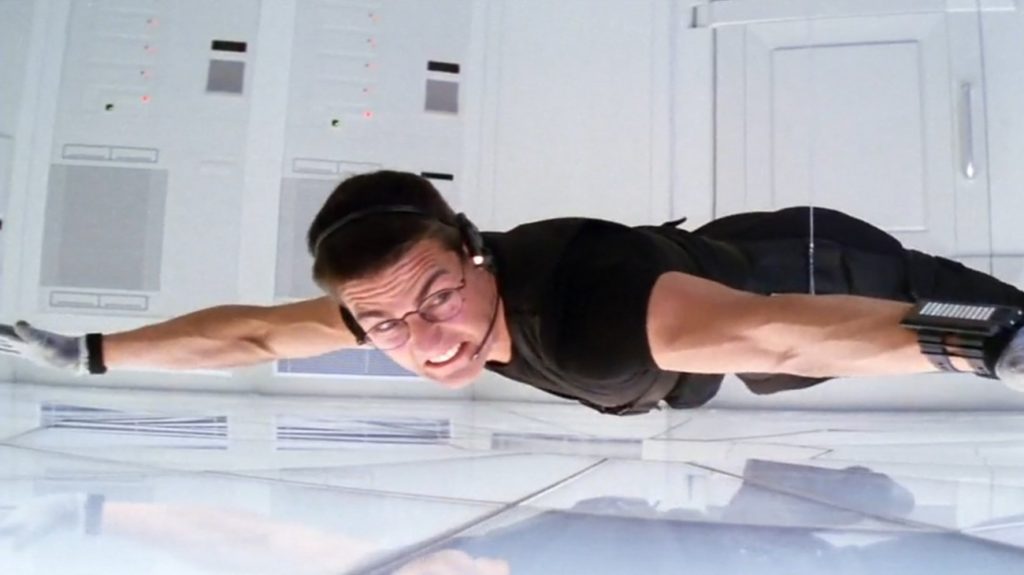
Day 1: Writing a Teaser
Day 2: Introducing Your Hero
Day 3: Setting up Your Hero’s Life
Day 8: Keeping Your Scenes Entertaining
Day 9: The Inciting Incident
Day 10: Refusal of the Call
I don’t talk about exposition nearly as much as I used to. The reason for that is, I find exposition to be very “Screenwriting 101.” It’s one of those things you obsess over as a beginner. And everyone is bad at it for their first five screenplays. But then, a lot like loglines, it’s one of those things where, if you stick around long enough, you figure it out, you know what I mean?
But today we’re going to forgo my reluctance because the first act is all about SETTING UP THE REST OF YOUR MOVIE and that means using a lot of exposition. For those of you new to the medium, exposition is defined as “relevant information about the characters and plot.” If you’re writing a heist movie, like Mission Impossible, all the scenes where the Mission Impossible team discuss how they’re going to break into the computer room – that’s exposition.
Or, if your character needs to pilot a jet in act 3 but there’s nowhere else in the script to fit in any jet-flying scenes, you’ll need some dialogue somewhere that lets your reader know your hero can do this. Han Solo: “And who’s going to fly it kid, you?” Luke Skywalker: “You bet I could! I’m not such a bad pilot myself.” That’s exposition.
You also may need to tell us about where your hero came from and what their current internal situation is, if they’ve had any traumatic experiences recently, like a death in the family, or if they have a drug problem, like Rue in Euphoria. This all falls under the umbrella of exposition. The good news is, you don’t always have to use dialogue to deliver exposition. You can show-don’t-tell. For example, if your hero is an alcoholic, show them drinking a lot in some non-cliche way and we’ll get that they’re an alcoholic.
The reason exposition is such a major focus in the first act is because when a reader comes into a story, they know nothing. You may know everything about your hero and the plot. But the reader doesn’t yet. So everything you tell them is going to be new information. Which means you’re going to have to explain some things. If you introduce a new character, you’re going to have to tell us who they are, what they do, who else they know in the script, how they know them, how they’re relevant to the plot. All of those things require exposition.
Likewise, when the inciting incident occurs in your script, your plot will form. And when your plot forms, you have to disseminate how it forms to the reader. When the Avengers learn that Thanos is going after all the Infinity Stones to snap half of life out of existence, they need to figure out how to stop him. That conversation is all exposition.
One of the things that’s critical to remember is that the story you choose will have a singificant effect on how much exposition you’ll write. If you’re writing a well-known template where the audience knows the rules already and you keep it simple, like, say, “Friends with Benefits,” you’ll have barely any exposition to write. But if you’re writing Lord of the Rings, you’re going to have to explain Middle Earth, 30 characters, what “the ring” is, why it needs to be destroyed, the plan for destroying it, who’s going to try and stop you, all the rules of this world, how the magic works — the amount of exposition is endless.
Another example of a heavy-exposition concept would be Moneyball. You have to explain the rules of baseball. What a general manager does. Who our general manager is. What his specific circumstances are (why is it that his team, the Oakland A’s, is so different from all the other teams in the league?). You have to explain the concept of moneyball (a complicated breakdown of players and stats and how it’s not about flashy stars but rather who gets on base the most). Anybody who’s written one of these scripts will tell you: it’s no picnic.
That’s something you need to take into consideration when you come up with an idea – is how much exposition you’ll be tasked with writing. The more plot, the more characters, and the more world-building there is in your idea, the more exposition-heavy your first act will be.
Okay, sure, we get it, Carson. Exposition is hard. What do we do about it?
What most writers do is take the path of least resistance. They lazily insert the exposition into the first act in a “workmanlike” way, taking the approach of, “Just get it out of the way.” I’m going to anger some readers here, but Christopher Nolan has become famous for this. Between Inception, Interstellar, and Tenet, the man has made an art out of long lazy expository scenes that set up his plot (and world). He didn’t used to do this, by the way. Memento deals with exposition quite elegantly.
The strategy for exposition should be the opposite of this. It should be: Make it as entertaining as you can.
Every time you’re faced with an exposition-heavy scene, ask yourself, “How can I make this as entertaining as possible?” That doesn’t mean you have to stick your lead characters in a car chase and have them dole out important plot points while they’re trying to catch the bad guys (although that’s an option). It just means make the exposition enjoyable instead of boring.
Let’s take Moneyball as an example. Because it has a tall task. It has to explain how the process of moneyball works, which involves the current state of baseball and how moneyball is different and stats and players and blah blah blah. Before I show you how they tackled this, I want you to imagine how you’d write this exposition scene. Because I can tell you how most people would write it.
Billy Beane (Brad Pitt) would be in another GM’s office, and the GM (general manager) would say something like, “Hey, have you heard of this new thing people are doing? They’re using computers to track players now and they’re learning that all the previous stats don’t matter as much as they used to and here’s the stats they do care about, let me list them for you so you understand this new concept of moneyball.” Somebody telling somebody else exposition, unprompted, is one of the worst ways to deliver exposition.
Instead, screenwriting masters Aaron Sorkin and Steve Zallian craft a mystery in regards to moneyball. Billy Beane is in a fellow General Manger’s office where he tries to get the GM to trade him a relatively unknown player, thinking it will be easy. The GM agrees at first, until some nerdy assistant in the corner shakes his head ‘no,’ and the GM goes back on the agreement, telling Billy he can’t trade him. It’s all rather hush-hush and mysterious.
WE’VE GOT OURSELVES A MYSTERY! That’s a great place to be when you need to dole out exposition. Because the reader is curious. “Hmm, what’s going on here?” they think. “I want to know what all the secrecy is about.”
So Billy hunts this nerdy assistant down and says, “Why didn’t you trade me that player?” What I’m about to tell you next is one of the top 5 rules when dealing with exposition: THE ASSISTANT DOESN’T WANT TO TELL HIM. There’s something about a character not wanting to give out the releveant information that cloaks the exposition, making it feel like it’s not exposition. So, here, the assistant can’t tell him because it’s trade secrets. But Billy keeps pushing and pushing until the assistant can’t hold it in anymore. And that’s when he explains how moneyball works.
Never once does the scene feel like exposition because, a) there’s a mystery involved, and b) the assistant only gives out the information reluctantly. Here’s the office scene…
And here’s the big exposition scene that follows…
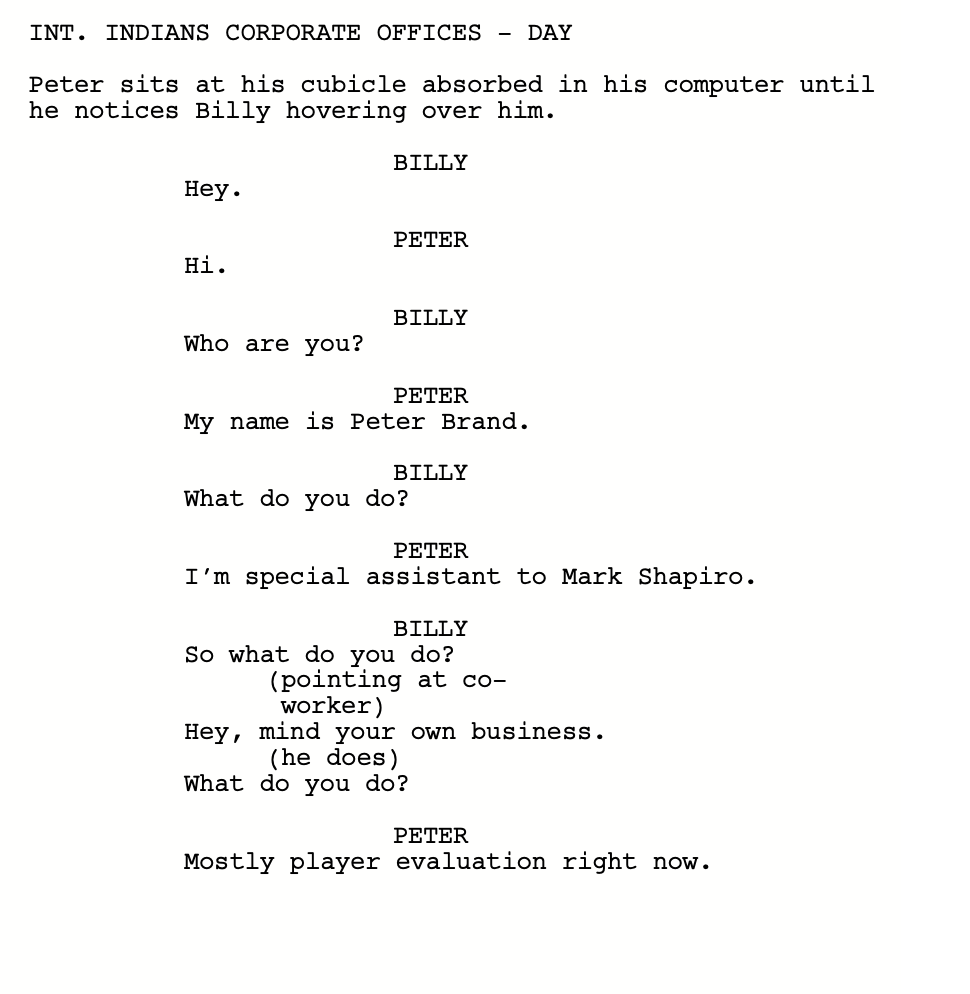
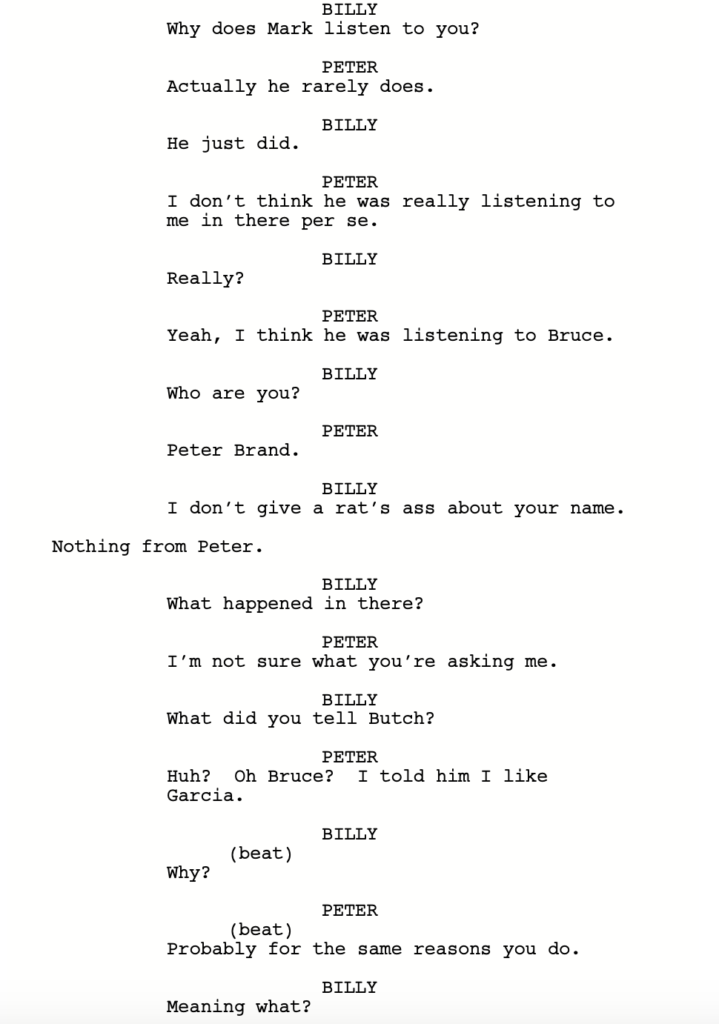
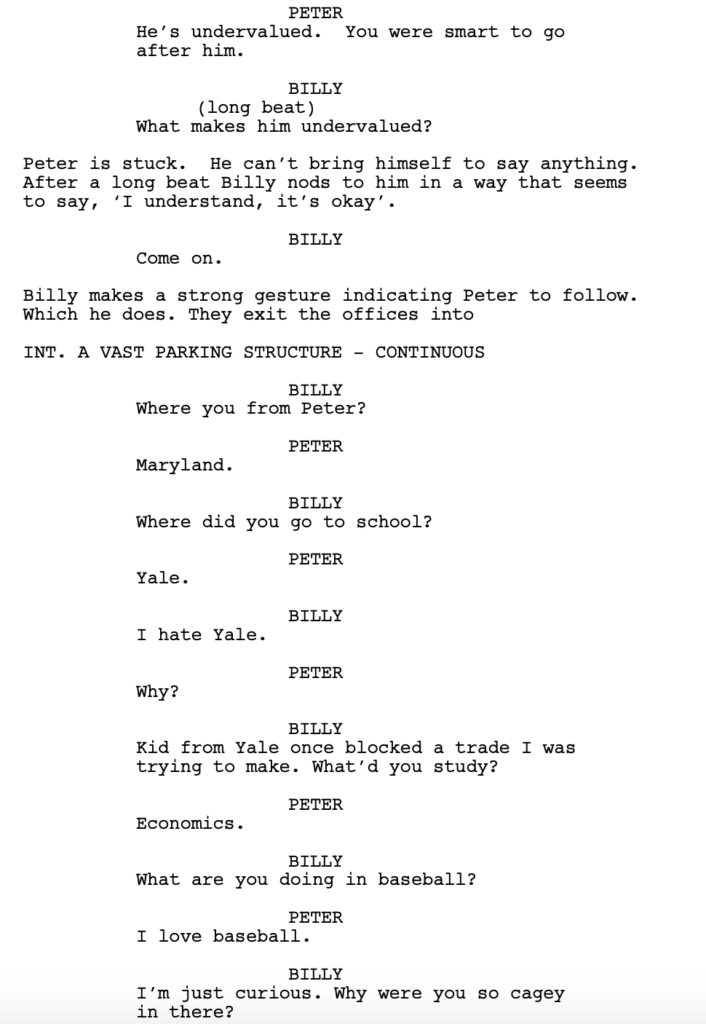
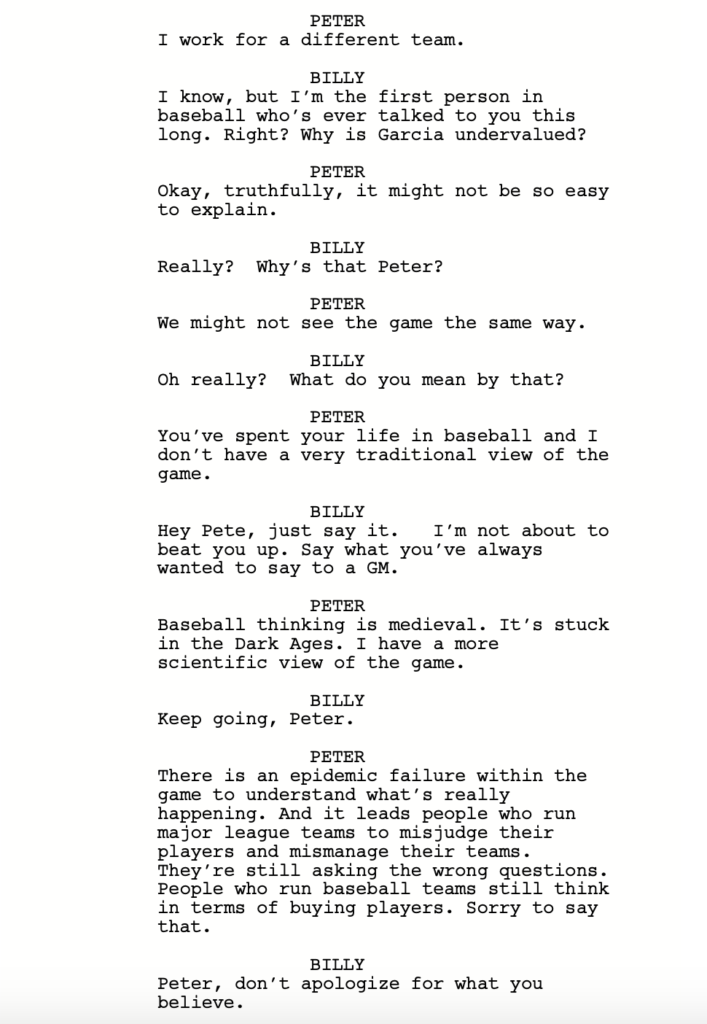
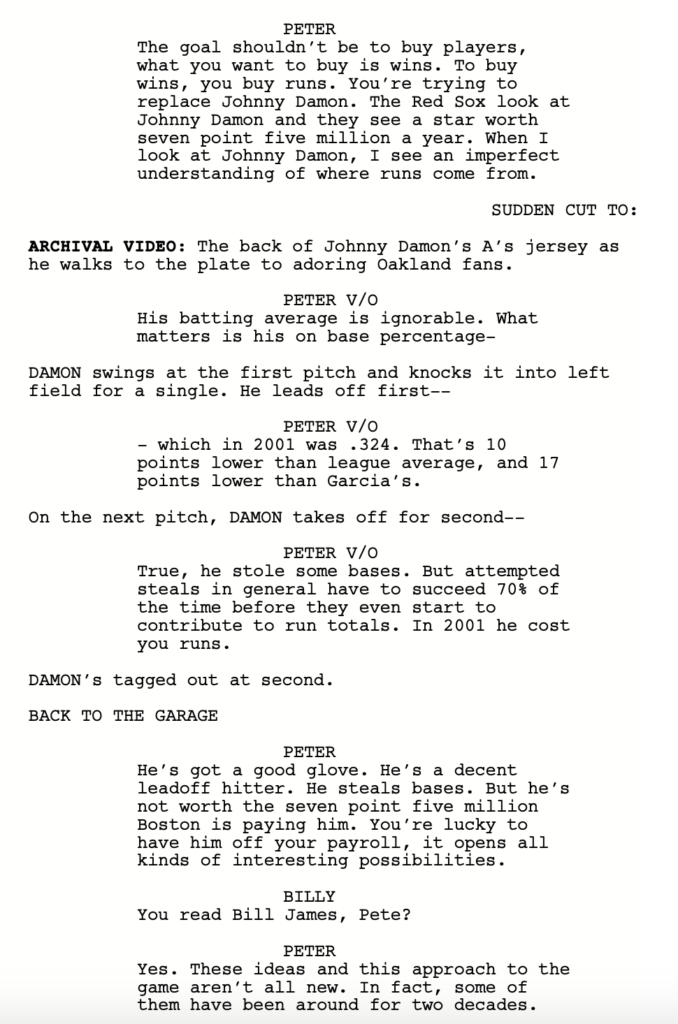
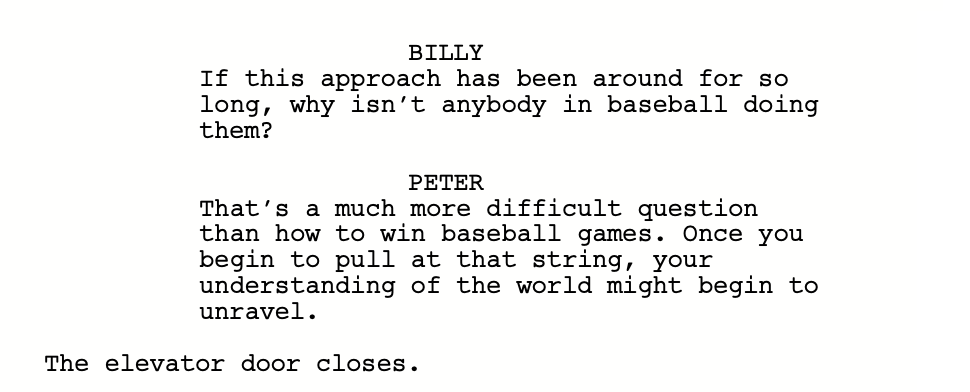
Note the clever twist in the middle of the scene, where he takes him to a more private place. This conveys to the reader that the information he’s about to tell him is secret and valuable. It also adds a little suspense. That’s good writing! I understand that this is a fairly specific example because it’s a sports drama, which not many people are writing. But the approach Steve Zallian uses is the same one you should be using. Which is: “I’ve got a bunch of potentially boring stuff I have to convey to the reader. How do I do so in a dramatically entertaining way?”
More recently, Spider-Man No Way Home dealt with this issue. The film needed to open up the multiverse, a complex concept that needed a lot of explanation, while also explaining that, by doing so, nobody would remember Peter Parker was Spider-Man. I can’t imagine having to come up with a scene that required as much exposition as this one. But the writers did exactly what they were supposed to do: Figure out how to convey this information in an entertaining matter. They do so by having Peter ask Dr. Strange all these questions about what’s going on and how this will affect him WHILE DR. STRANGE IS IN THE PROCESS of executing his spell. Conveying exposition during an exciting moment is a time-tested way to tackle the exposition problem.
As I pointed out in my review of the film, though, the scene didn’t work. It was too jumbled and tried to do too many things at once. But the spirit of what the writers did was correct. They’re giving the viewer exposition through a dramatically entertaining scenario.
In summary, whenever you write a first act, most of your scenes will contain exposition. If it’s a little exposition – try to contain it to as few lines as possible. If it’s a lot of exposition, try to come up with a scene that delivers that exposition in a fun way. Feel free to share your own exposition tricks in the comments! And keep writing those pages!
Next First Act Post: Thursday, March 17
Pages to write until next post: 4
Pages you should have completed by Thursday: 24
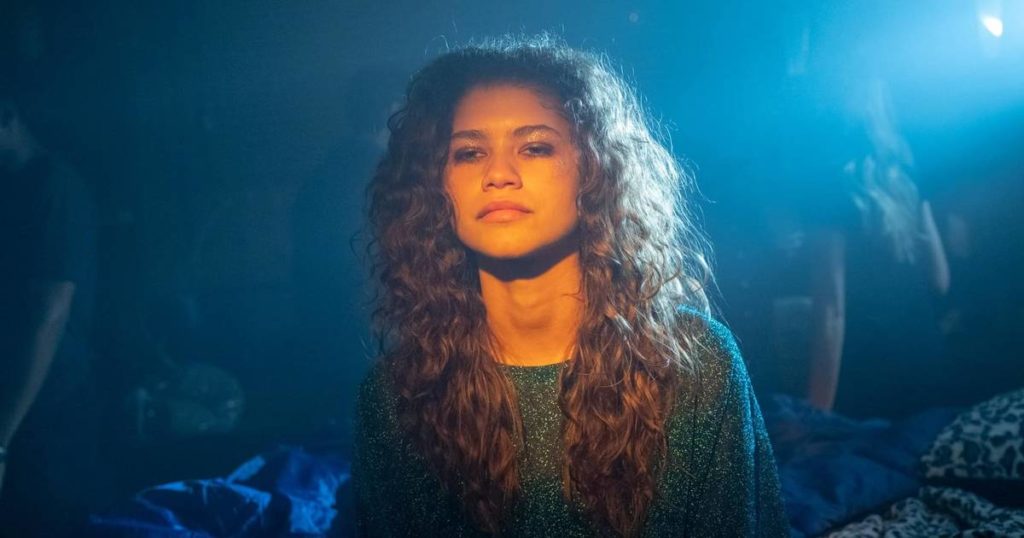
Last year I checked out the Euphoria pilot and lasted about twenty minutes. Admittedly, I watched it at a time where I was exhausted by anything that was even remotely political. And while Euphoria isn’t a political show, it touched on some hot-button topics that were politically-adjacent enough to turn me off. So I bailed.
But when The Bachelor let me down by having one of the worst seasons in memory, a TV slot opened up in my schedule. So I gave Euphoria a second chance, sans the baggage I brought into it the first time. Stripped of any preconceived notions, I experienced a show that wasn’t just good. It was groundbreaking.
I’ll get into the writing in a second. But just from a directing perspective, this show was amazing. To be fair, the show must have an ungodly budget. Because there isn’t a single scene where they give a master, then two over-the-shoulders, and call it a day, like your typical TV drama.
If you’ve got two characters in a room, you’re going to have a drifting overhead camera. You’re going to have a musical dance number. You’re going to have a dream sequence. You’re going to have an elaborate lighting setup that took 72 hours to prep. Even close-ups are never static. They’re always moving in some way.
It’s got to take them 10 times as long to shoot one two-person dialogue scene than it takes the average production. Which is why it feels special.
When it comes to the writing, Euphoria reinforced the magical formula for making any act of fiction work. Whether it’s a TV show, a movie, even a Youtube sketch, the thing you have to get right IS THE CHARACTERS. If you create complex interesting watchable characters, you can get away with anything.
The lead character is Rue, a 17 year old drug addict. While Rue can be passive, she’s fascinating in that she’s so self-destructive. Every time she clears a hurdle, she falls back down five sets of stairs. She’s also the narrator of the story, which allows the writers to jump around all the different storylines easily. I see a lot of writers make the mistake of jumping around chaotically and expecting the reader to be able to keep up. If you’re going to do that, do what Euphoria does. Put a narrator in there to explain where we’re jumping and what’s going on.
Next up we have Jules, who’s a 17 year-old transgender girl who’s just moved into town. Rue becomes infatuated with how unique and free Jules is, and the two become fast friends. An early scene also has Jules setting up and engaging in an intense sexual session with a 45 year old man. It instantly sets this tone that Euphoria is going to be different from your average TV show. It does things you’re not supposed to do.
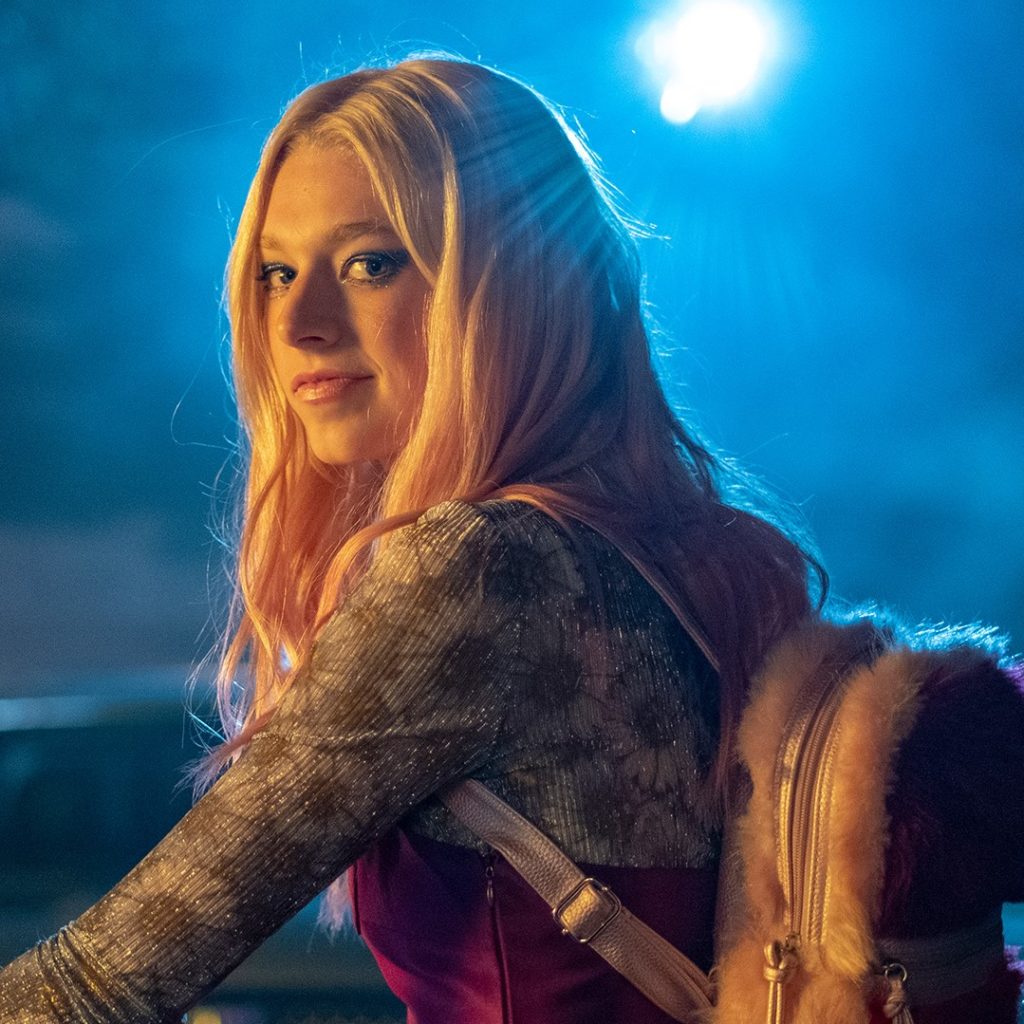
Let me take a quick detour here because this is an important point: When everyone’s doing the same thing, ask what you, as a writer, can do that’s different. The Euphoria writers clearly sat down and said, in a world where every teenage show ever lies about what high school is really like, we’re going to be the lone truthful voice. We’re not going to sanitize anything. We’re going to show the messiness. We’re going to show the secrets, even if they’re uncomfortable. And we’re not going to pull any punches. That decision alone is what made the writing in Euphoria 10x as impactful as any other show being written right now.
Our main guy character is Nate Jacobs, high school QB and the son of the man who had sex with Jules. Nate, like his father, has some questions about his sexuality, which makes for a very tortured character. When you’re writing any character, one of the things you should be looking for is internal conflict – something that the character is battling within themselves. When you do that, the character is always in a place of struggle. And struggle is more interesting to watch than stability.
The show also has a host of a great secondary characters. There’s the overweight junior, Barbie, who struggles with her appearance until she runs across the option to cam online, and becomes a success at the expense of a lot of twisted middle-aged men. There’s Cassie, the hot girl, who has zero self-esteem and lets men run roughshod over her.
There’s one of my favorites, Fezco, Rue’s drug dealer, who deals from his convenience store with his 10 year old step-brother, Ashtray. I at first saw these two as a gimmick. I mean, come on. A 10 year old drug dealer? But the first episode of season 2 that goes into the backstory of how Fezco and Ashtray came to be, was my favorite episode of the series by far.
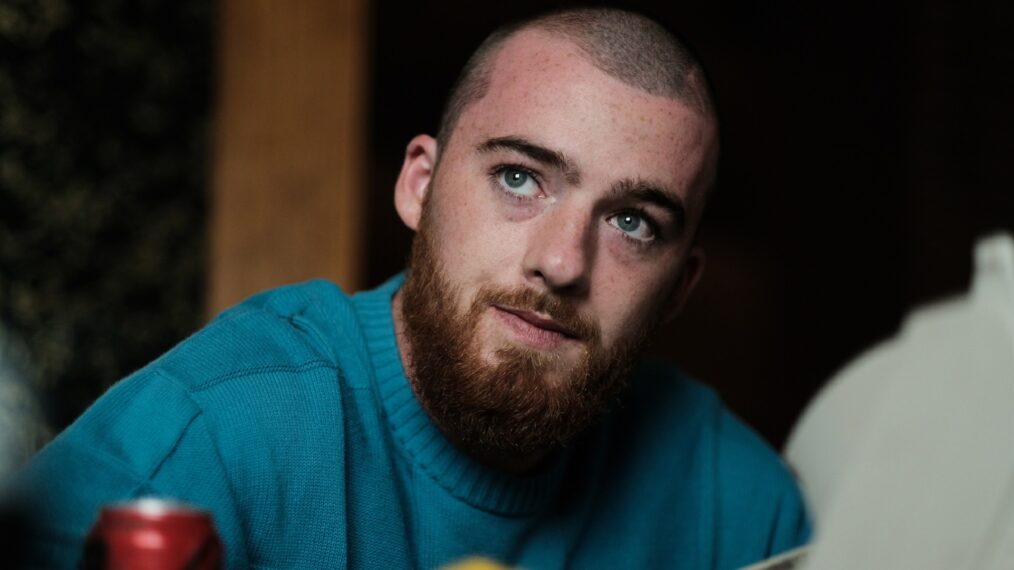
And then you have Cal Jabobs, Nate’s dad, the one who had sex with Jules. When Cal realizes that Jules runs in the same circles as his son, his life becomes one giant act of squirming. He’s constantly trying to avoid getting exposed. And that storyline is one of the more entertaining ones in the show.
Outside of the characters, the reason I like this show so much is that it takes chances. Even though those chances don’t always pay off. I remember one episode where Rue’s mom reads a letter in front of the church about what it’s like to have a daughter who’s a drug addict, and the writers try to pull a Scorsese where, during different parts of the letter voice over, we’re cutting to different characters in the story dealing with their own issues that don’t line up at all with the letter the mom is reading. I’m sorry but the excruciating pain you went through when your daughter was on life support has nothing to do with Maddy and Nate’s break-up.
But it hits a lot more than it misses. There’s a scene in the second season where Barbie (the overweight girl) is searching for help for her self-esteem issues online and instead of just cutting to comments or Youtube videos on a laptop screen, the writers physically bring the online personalities into Barbie’s room. And they’re all making their plea. They’re all telling her how to be more confident. And it was just creative, you know. That’s all we’re asking for as viewers. We want to see something familiar presented in a fresh way. Cause that freshness is what elevates your material above the stuff on the CW.
What’s great about this show is that it even gets the cheap stuff right. One of my favorite sequences is when Nate, who’s dating Maddy, brings Cassie into a bathroom at a party to have sex with her. Maddy realizes Nate (but not Cassie) is in the bathroom and starts banging on the door. There’s nowhere for Nate or Cassie to escape so they have to come up with a plan.

Nate has Cassie hide in the bathtub with the shower curtain drawn, and then goes out into the hall to placate Maddy. But Maddy needs to go the bathroom, so she blows by Nate and into the bathroom. Now Maddy is unknowingly in the bathroom with Cassie, who’s just had sex with her boyfriend.
When you create one of these situations, your job as a writer is MAKE THIS AS BAD AS POSSIBLE FOR YOUR CHARACTER. So that’s exactly what they do. When Maddy finishes and goes back into the hall (“Thank God,” we think! “Cassie is safe!”), another guy is waiting, and he asks Maddy if she wants to smoke a joint with him… you guessed it… back in the bathroom. She says yes, and now we’re right back in the bathroom with Cassie having to worry about two people instead of one.
I won’t get into the fine details of the scene but the writers add even more obstacles for Cassie to overcome, all of which are harrowing. It was such a simple scene. And yes, it was cheap. But it was captivating because the writing was so on-point.
I could go on about this show. The characters, the scene-writing, the risks it takes, the unpredictability of the narrative. It’s all great. And I have to give it to HBO because they are the Marvel of television. It’s them, and the next runner is 15 miles behind them. Whatever they’re doing over there needs to be researched and dissected because the quality they put out on a yearly basis is heads and tails above the competition.
Have any of you seen Euphoria? Curious to know what you like or dislike about it.
One of the more misunderstood sections of the script – the Refusal of the Call!
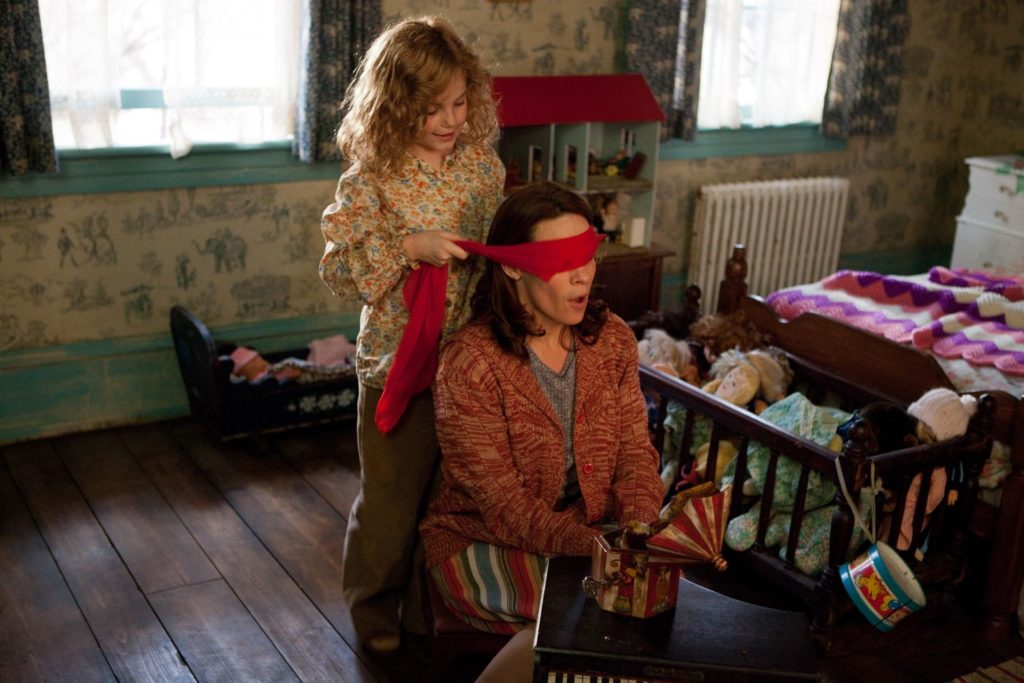
Day 1: Writing a Teaser
Day 2: Introducing Your Hero
Day 3: Setting up Your Hero’s Life
Day 8: Keeping Your Scenes Entertaining
Day 9: The Inciting Incident
So yesterday we dealt with the inciting incident, which typically takes place between pages 12-15. If you’re doing your math correctly, you know that there’s still 10 pages left before the end of your first act (page 25). Once you reach the second act, your character will go off on their journey, whether it’s to destroy the one ring, find the killer, win the big match, take down the Nazis, find the treasure, get their dream man, or whatever their goal is.
So the question is, what do you in the meantime? What do you do between pages 15-25? I recently watched a handful of first acts and I realized that the answer to that question isn’t as cut and dried as you’d think. Because, traditionally, this section is known as the “Refusal of the Call” section. But not every movie uses it for that purpose.
The idea behind the “Refusal of the Call” is that your hero has just had their life upended by the inciting incident. That’s a jarring moment for them. Imagine that you learned all of your life savings, which you’d been saving up for 25 years, was gone. You unknowingly invested it in a Ponzi scheme, which just got exposed.
It’s unlikely, mere minutes after you learned this, that you would hop into action and start hiring lawyers to try and get all your money back. Instead, you would probably be in shock. You would need a couple days before you could process what was going on. That’s how I want you to see the Refusal of the Call. It’s not so much an artificially constructed moment where the hero says, “I’m not going on this mission because there’s still 10 pages left in the act!” It’s an organic moment where the character struggles to comprehend what’s just happened.
In this moment, a character is motivated by shock, by fear, by the amount of work it will take to go on this journey. So their initial reaction is always going to be, “No thank you.” But then there comes a secondary development where it makes less sense to stay than it does to go. So your hero goes.
Unfortunately, I’ve found that every movie treats this section differently and I suspect it’s because the average screenwriter knows about act breaks and the inciting incident, but not much else. So a lot of writers will fudge this section. With that said, it usually doesn’t affect the movie because it’s only ten pages and we know, at the end of those pages, we arrive at the beginning of the adventure.
However, I did have a helpful realization when watching these first acts, which was, if the inciting incident lines up with your hero’s job, it doesn’t make sense for the hero to refuse the call. For example, Indiana Jones looks for ancient antiquities. Therefore, when his inciting incident comes (the government wants to hire him to find the Ark of the Covenant), it makes zero sense for him to say no. This is what he does. It’s his job. So of course he’s going to say yes.
Contrast this with Star Wars, where the inciting incident is Obi-Wan prompting R-2 to play Leia’s message, where she asks him to take R2 to Alderran. Traveling across the galaxy avoiding the Empire is not Luke’s job. Luke is a farmer. So it makes more sense for Luke to refuse the call, which he does.
Okay, so now that we know what the Refusal of the Call is, what do we do with those 10 pages? I hate to be vague, but while doing my research, I found you have all sorts of options with these pages. If we’re sticking to the letter of the law, a hero who doesn’t refuse the call (Indiana Jones) will have one or two prep scenes before going on the journey. For a hero who does refuse the call, they will enter a state of stasis, like I talked about above. They’re in shock. They’re in denial. We may show them trying to go back to their lives. But then a secondary event will happen (Luke’s aunt and uncle are killed) that forces them to go on the journey.
With that said, here are some first acts I watched where the refusal of the call was a little confusing.
First, I watched Crazy Stupid Love. This is the Steve Carrell (who plays Cal) movie where a family man is forced back onto the singles scene. The inciting incident actually occurs on page 4. That’s when Cal’s wife, Emily, tells him that she cheated on him and wants a divorce.
This creates a giant 20 page chasm before the end of the first act. So what do we do in that time? Well, Cal goes into a state of stasis. He’s in denial. He doesn’t understand a world where he’s not married. He drinks. He mopes. So he’s doing the proper “refusal of the call” checklist. But what I realized was that Crazy Stupid Love has a ton of characters to set up. It has to set up Jacob (Ryan Gosling), Cal’s daughter, Hannah (Emma Stone), the babysitter, the son, the wife. All of these characters have intricate storylines that need a lot of setup. So we’re cutting away to a lot of those characters, which easily fills up the time between inciting incident and second act. But, finally, on page 25, Jacob starts teaching Cal how to be a cool single guy, meaning we’re officially in the second act.
This is a long way of saying, the time between your inciting incident and second act can be used to set up other characters in their own scenes, away from the main character. We don’t always have to stay with the main character. This could also be a good place to introduce your antagonist. As long as your general theme of the page 15-25 section is stasis or resistance (from your main character), you’re good.
Another first act I watched was Shazam! And this one was a tough nut to crack because it doesn’t create the inciting incident moment you’d expect, which is for Billy Batson to find the costume and become Shazam. Instead, at minute 15, Billy, who’s an orphan without a home, is caught by the cops and placed into a foster care home with eight other orphans. So it’s really more of a character-driven inciting incident than it is a plot-driven one.
But the movie does embrace the refusal of the call. Billy is already planning his escape less than five minutes after he arrives at the home. On the first day of school, however, he’s attacked by bullies, runs for it, gets on the train, and the train goes into another dimension where he arrives at the Shazam cave and is turned into Shazam (at minute 30).
What I’m learning from watching these films is that the more key characters there are, the harder it is to line every plot beat up where it’s supposed to be. Because you have to cut away to 2, 3, sometimes 4 different characters and set up their storylines separate from your hero. That takes up pages, which is what screws up the model. That’s what happened with Shazam. They had to set up the Shazam god in the opener, then the main villain, the orphan family, the handicapped step-brother, Freddy. It was too much to deal with and stay on schedule.
Next up we have The Conjuring and boy was this one wonky. The story follows Roger and Carolyn who move into a new farm house with their family, only to learn that it’s haunted. In any “haunted house” movie, the inciting incident will be the homeowners realizing the house is haunted. That’s obvious.
But The Conjuring does this weird parallel co-heroes thing where, throughout the first act, we’re spending just as much time with Lorraine and Ed Warren, the ghost-hunters, as we are Roger and Carolyn. This pushes all of the haunted house plot beats back, making it hard to identify where the actual inciting incident is.
I would argue that it occurs at minute 15 when they find their dog dead. But they don’t necessarily know the house is haunted yet so I’m not convinced it is the inciting incident. To the screenplay’s credit, it keeps introducing scary moments that make us want to read more. For example, we get the famous blindfolded hide-and-go-seek game. We get the scene with the kids in their bedroom and one of them is telling the other that there’s someone standing right behind them, even though we can’t see anyone.
If I’m to take anything from that, it would be, as long as you keep dangling delicious carrots in front of the audience, they’ll want to keep watching, which will allow you to introduce your major plot points later than usual. But I would be careful about this. The Conjuring script never had to win a single reader over. It was developed in-house. Your script will need to win readers over, so the sooner you can hit those plot beats, like the inciting incident, the better.
That means aiming for a page 15, or slightly sooner, inciting incident. And then ten pages of stasis, reluctance, denial, as well as introducing other major characters in the script. It just feels right for the audience to have those scenes where the hero doesn’t want to go on the adventure. Because then the audience is thinking, “Oh no. What if they don’t go??” That doubt is what makes them finally agreeing to go on the journey that much more exciting.
I don’t want to downplay that last part because I think it’s the reason they invented the refusal of the call in the first place. A movie is supposed to take the audience on an emotional journey. That makes you take them all the way up, then all the way down, then back up, then down, up, down, up, down. Without the refusal of the call, we rob the audience of one of those big emotional swings. And those swings are powerful. Big emotional sways are what get people addicted to things.
Okay, that’s it for this week. I hope you guys are all cooking along. Keep asking questions in the comments. Upvote questions you want answered. I will get to those in week 4.
Have a magical writing weekend!
Next First Act Post: Monday, March 14
Pages to write until next post: 5-6
Pages you should have completed by Monday: 20
The most exciting scene to write in a script? The inciting incident!
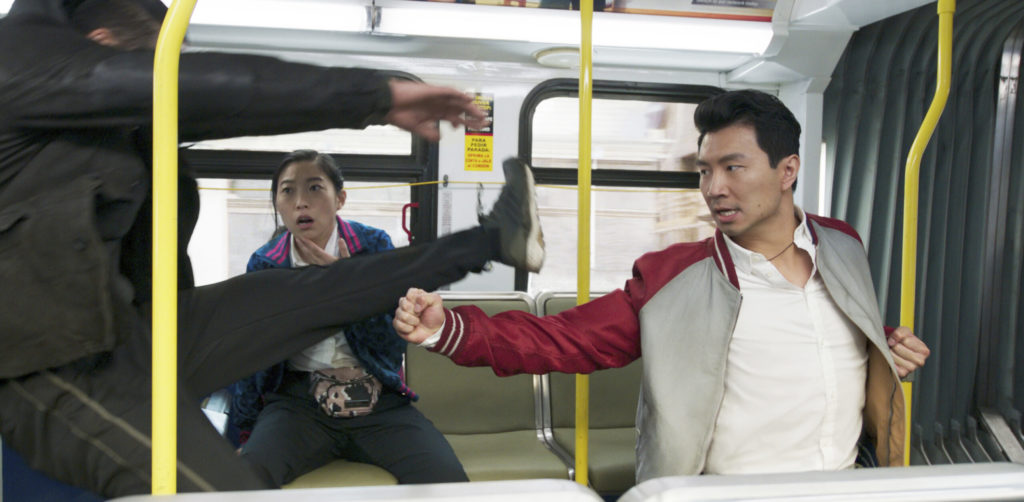
Day 1: Writing a Teaser
Day 2: Introducing Your Hero
Day 3: Setting up Your Hero’s Life
Day 8: Keeping Your Scenes Entertaining
Okay, let’s summarize where we are. So far, this is our page count…
Pages 1-5 — Teaser.
Pages 6-8 — Introduce your main character.
Page 9-14 — Set up your hero’s work life, family life, and social life.
A couple of notes here. You want to combine setup wherever possible. Therefore, when I say pages 6-8 are where you want to introduce your hero, that doesn’t mean you only have to introduce your hero in that scene. You can also introduce a second big character. Likewise, you don’t have to wait until page 9 to start setting up your hero’s work life. You can set up their work life when you introduce them.
Also, if you don’t use a teaser, this allows you 5 extra pages to play with in the opening act. Therefore, you can use those pages to more extensively set up your hero’s life. That’s the only downside of teasers, is they limit the amount of time you have to set things up. So be judicious about what kind of story you’re writing and decide if it’s the kind of movie that’s right for a teaser. If you have a ton to set up and, therefore, need pages, a teaser might not be for you.
This brings us to today’s topic, the inciting incident, which will usually occur between pages 12-15. This is assuming you’re using the traditional Hero’s Journey model. There’s no reason you can’t place your inciting incident on page 5, or even page 1. It all depends on what kind of movie you’re writing. However, for now, we’ll look at the inciting incident as it pertains to traditional structure.
So what is an inciting incident? The way I see it, the inciting incident is the beginning of the plot. Up until this point, your character has been existing in their world, oblivious to the machinations of what’s happening around them. But the inciting incident comes to their doorstep and says, “Here I am. You have to deal with me.”
This creates a situation where you hero must ACT. Which is a good thing when it comes to storytelling because the more active your hero is, the more exciting the story tends to be.
The wonderful thing about the inciting incident is that it sets up your GSU. It gives your hero his goal (solve the problem) which allows you to add some stakes (if he doesn’t, something bad happens to him) as well as some urgency (he must complete the task by [x many minutes/hours/days]).
I saw Shrek trending on Netflix yesterday. That movie has one of the clearest examples of an inciting incident. Shrek is minding his own business, living his best life in his swamp house. He’s got peace. He’s got quiet. Then – BAM! – he walks outside one evening to see his entire swamp invaded by fairy tale creatures. A gigantic problem has literally been dropped at his feet.
Mind you, this is another way to look at the inciting incident. It’s a PROBLEM. But not your everyday problem. It’s, up until this point in your hero’s life, the biggest problem they’ve ever had to deal with. If that isn’t the case, you’re probably focusing on the wrong moment in your hero’s life.
I rewatched Shang-Chi recently. That movie’s inciting incident occurs on the famous bus-attack scene. Shaun and Katy are minding their own business, heading to work, when some dudes try to steal the pendant around Shaun’s neck. Shaun beats everyone up and concludes that if bad guys are trying to steal his pendant, they’ll be trying to steal his sister’s pendant as well. So off he goes to warn her.
In the Netflix movie, “The Guilty,” starring Jake Gylenhaall as an emergency operator, the inciting incident is when he gets a strange call from a woman acting cagey. He eventually realizes she’s been kidnapped by her dangerous ex-husband and is pretending to call her daughter. A gigantic problem has been established. Jake now needs to figure out where this car is and get some cops to save her.
In It Follows, the inciting incident occurs after our lead, Jay (female), wakes up tied to a chair in a parking lot after having had sex with her date. Her date informs her of the rules. That she has to pass the curse on to the next person or else the previous curse-holders will come after her.
In Bird Box, we have Malorie (Sandra Bullock) going to the hospital with her friend, Jessica, for a pregnancy checkup. Afterwards, Jessica drives Malorie home. As she drives, Jessica starts freaking out then tries to kill them both in a crash. Talk about an intense inciting incident!
In Argo, the inciting incident occurs when there’s an uprising in Iran. A group of American governmental workers are stranded there and must hide out . This problem is dropped at the feet of our protagonists, back in America, who now must figure out a way to rescue them.
What’s interesting about this inciting incident is that it doesn’t so much happen to a single protagonist as it does an entire group of protagonists, as it’s going to take a team of Americans to get them out. I bring this up for anyone wondering if inciting incidents only work when there’s a single protagonist. No. An inciting incident is a giant problem introduced into the story. That problem could require one person to solve it or an entire group of people (see also: Avengers).
As I alluded to above, not every screenplay has to abide by the “inciting incident on page 12-15” rule. Believe it or not, The Hangover’s inciting incident occurs at the exact same moment we transition into the second act – the guys all wake up after a crazy night out with no recollection of what happened and a groom who’s disappeared.
The whole reason an inciting incident comes when it does is because the audience’s expectations are for something interesting to happen in those first 15 minutes. If you go 30 minutes without anything interesting happening, most modern audiences will tune you out. So it’s a big risk whenever you extend the inciting incident beyond page 15. The reason that The Hangover gets away with it (their inciting incident occurs on page 24) is because listening to our three leads squabble in the lead-up to the incident is so darn funny.
On the other end of the spectrum, we have Cloverfield Lane. That movie starts out with its protagonist, Michelle, leaving her fiance, getting in her car, and driving back to her home state. While driving, her car is struck, she flips off the road, and wakes up in a cold dark room, chained to the wall. We have reached the problem, aka “the inciting incident,” just four pages into the story!
I have no issues with early inciting incidents. They work well in tense thrillers or horror script when you want to pull the reader in immediately. Just make sure you have enough “Richter scale” plot moments to balance out the rest of the screenplay. One of the reasons you typically wait until page 15 to introduce the inciting incident is because the reader knows you’re building up to a big moment and are willing to wait for it. If you go to that moment immediately, it’s the equivalent of bribing your kids with candy five minutes into a road trip. You’ve sort of used up your ‘ace in the hole.’
To me, the inciting incident is one of the most exciting scenes to write because it’s the whole reason you wrote the script in the first place. It introduces the plot, the concept, everything. And now we get to see how our hero deals with the problem. We’ll get into that (dealing with the problem) more in a bit. But this would be a good time to remind new writers that, as fun as the inciting incident is to write, it is not the end of your screenplay. It’s the beginning.
The inciting incident scene should not be the pinnacle of your screenplay because that means the pinnacle of your screenplay is happening on page 15. A good example of this is Spielberg’s War of the Worlds. I’m sure you remember the inciting incident in that film, where Tom Cruise and his family run down the street while a highway overpass crumbles behind them. After some cool shots of Tri-Pod aliens killing people, do you remember any imagery or scenes from the movie after that? I’m guessing you don’t. That’s because they made the inciting incident the pinnacle of the movie.
To summarize, the inciting incident occurs after you’ve set up your hero’s normal life, typically between pages 12-15, although that may change depending on the kind of movie you’re writing. The inciting incident creates a big problem in your hero’s life that he must deal with. It should be one of the biggest and most memorable scenes in the movie. But make sure not to make it the best scene. For every big scene that follows, use your inciting incident as the bar you’re trying to beat. That way your script gets better as it goes on as opposed to worse.
Next First Act Post: Thursday, March 10
Pages to write until next post: 2
Pages you should have completed after today’s assignment: 15

